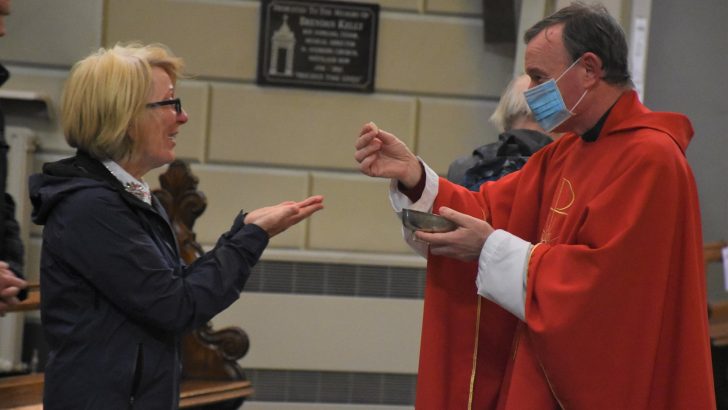The Second Vatican Council (1962-65) succinctly describes the Eucharist as “the source and summit of the Christian life”. It says that everything that we do as believers is bound up with the Eucharist and is oriented towards it. From the very beginning, the followers of Jesus gathered together on the Lord’s Day for the Eucharist.
Down through the centuries, countless numbers of Catholics have given their lives for the Eucharist. In the year 304, the Emperor Diocletian forbade Christians, on pain of death, from possessing the Scriptures, from gathering on Sundays to celebrate the Eucharist and from building places in which to hold their assemblies.
In Abitene, a small village in present-day Tunisia, 49 Christians were taken by surprise one Sunday while they were celebrating the Eucharist. They were arrested and taken to Carthage to be interrogated by the Proconsul Anulinus.
Joining together
Significant among other things is the answer a certain Emeritus gave to the Proconsul who asked him why they had disobeyed the emperor’s severe orders. He replied: “Sine dominico non possumus”: that is, we cannot live without joining together on Sunday to celebrate the Eucharist. We would lack the strength to face our daily problems and not to succumb.
Catholics in the Republic are currently banned from attending Mass. The liturgy is available online in many parishes, but it’s a very poor substitute.
Not everyone agrees with me, though. Even some priests have argued with me that virtual Masses are almost just as good as gathering together on Sunday for Mass. A priest on social media wrote over the weekend that he thought the ban on Mass is a good thing because we are too focused on the Mass.
This pandemic has exposed that some people are more vulnerable and others more frightened about public worship”
I think we need to ask ourselves questions about the theological assumptions underpinning such a view. Christ gave us the sacraments for a reason. If we’re not at Mass, we’re missing out on what Christ personally invited us to.
For a Christian in the Protestant tradition where the sacraments instituted by Christ are not that important, Zoom or Facebook may be a good substitute. But Catholics – whether they realise it or not – need the sacraments. And don’t take my word for it, Christ left us himself in the Eucharist as real food.
It’s said – in good faith, no doubt – that being banned from going to Mass also helps us be in solidarity with those Catholics regularly denied the Mass in other parts of the world. But whether it is persecution or a lack of clergy that prevents Catholics in other parts of the world regularly attending Mass, we must recognise that their situation is sub-optimal and not something to strive for.
Dispensation
This pandemic has exposed that some people are more vulnerable and others more frightened about public worship. The dispensation from attending Mass must remain – but those who can gather in a safe way must be allowed to so do.
I’ve heard some argue that we need a less sacramental Church or a Church less-centred on the Mass. People said the same 500 years ago and created their own following of Jesus. But, a Church not centred on the Mass is not the Catholic Church.
Sine dominico non possumus.
To join Friends of The Irish Catholic and support Catholic journalism, please fill in the form on page 9 of this week’s issue or visit here.. You can also phone 01 6874094 for more information or to make a contribution.


 Michael Kelly
Michael Kelly Veronica Lane receives Communion from Fr Enda Cunningham in St Andrew's Church, Westland Row, Co. Dublin.
Photo: Chai Brady
Veronica Lane receives Communion from Fr Enda Cunningham in St Andrew's Church, Westland Row, Co. Dublin.
Photo: Chai Brady 